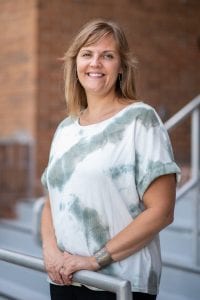New Faculty Member Brings Human Origins Expertise To Classroom This Fall
 One of the newest additions to the Department of Anthropology faculty will bring a specialized perspective on the evolution of humans to students this fall.
One of the newest additions to the Department of Anthropology faculty will bring a specialized perspective on the evolution of humans to students this fall.
Sarah Freidline, Ph.D, studies the origin and evolution of Homo sapiens using three-dimensional shape analysis, geometric morphometrics and bone histology techniques. These tools help her virtually reconstruct and quantify the morphological variations found in the skulls of fossils.
“Genetic data suggest that Neanderthals and Homo sapiens evolved from a common ancestor around 500,000 years ago, but there are many gaps in the human fossil record during this time period,” said Freidline. “To address this question I use three-dimensional analyses, allowing me to quantify morphological variation during growth, through time and across species.”
She continues: “My favorite part about being an anthropologist is the traveling. There is something magical about handling fossils of ancient humans hundreds of thousands of years old in the places they impacted history.”
Freidline’s work has made significant impacts on the field of paleoanthropology; most recently she was asked to provide analysis on the Xiahe Denisovan mandible in Tibet. Denisovans are an ancient group of hominins separate from both Homo sapiens and Neanderthals believed to inhabit parts of Asia. She has also contributed to the analysis of human fossils discovered in Jebel Irhoud, Morocco — the oldest H. sapiens fossils yet discovered.
“My morphometric analysis on the mandible is the first study to show what the Denisovan mandible looks like and how it compares to other fossil taxa,” said Freidline.
Freidline comes to UCF by way of a PhD and post-doctorate program in Germany at the Max Planck Institute for Evolutionary Anthropology. This coming fall, Freidline will have her own paleoanthropology lab where she will continue her research on human evolution, fossil reconstruction and quantitative methods.
“After being out of the country for so long, I was very ready to turn to the United States,” said Freidline. “I’m looking forward to working with and mentoring students in my own lab.”
